
ERIE, Pa.–As voters drown in a sea of high-priced, negative TV and radio ads, grassroots groups can throw them a lifeline: a meaningful personal interaction that might snare their votes, if research findings hold.
One such group is being formed in Pennsylvania, a critical swing state, to build support for former President Donald Trump. The new group is patterned after a similar organization in Florida, where Dr. Anthony Ruffa now lives after working 35 years as a physician in Erie County, Pennsylvania.
Ruffa saw Club 47 USA, the nation’s largest organized group of Trump supporters, draw droves to its meetings in Palm Beach County, Florida. Inspired, Ruffa joined forces with four politically savvy people to launch a group called AmFirst 47 in Erie County.
He thinks the Pennsylvania club will fill a void for Trump supporters who are reluctant to declare their allegiance publicly or don’t know where to direct their energy.
“There are so many people who are for Trump, but they don’t have that outlet,” Ruffa told The Epoch Times. “They want to get involved.”
The Florida and Pennsylvania clubs both include the number, “47,” to indicate they support Trump, the 45th president, in his quest to displace President Joe Biden and become the nation’s 47th president. Republican Trump and Democrat Biden are the current frontrunners among candidates vying to become each party’s presidential nominee.
Although online fan groups support Trump, Biden, and other politicians, it’s unclear whether any organized in-person “clubs” exist for presidential candidates other than Trump.
It’s also hard to pin down how much effect such clubs might have on the success of candidates. But scholarly research, coupled with anecdotes from Erie County voters and politicos, suggests that personal connections with voters could pay off at the ballot box more handsomely than high-priced advertising.
The Florida and Pennsylvania Trump groups welcome people of all political stripes as long as they support Trump and his “America First” policies–shortened to “AmFirst” in the Erie group’s name.
These pro-Trump clubs differ from conventional political organizations. Neither group raises funds for any politician. They’re also not directly tied to any specific political party or candidate’s campaign organization, although they’re happy to work with political leaders.
Leaders of both Trump clubs shy away from talking about his political rivals.
Hours before Florida Gov. Ron DeSantis declared his candidacy on May 24, Larry Snowden, Club 47’s president, declined to comment about DeSantis’ entry into the race. “It’s irrelevant,” he said.
Instead of bashing opponents, leaders say Club 47 and AmFirst 47 remain focused on correcting misconceptions about Trump, neutralizing criticisms of him, and educating potential voters about his successes and plans for the future.


In an apparent nod to Trump’s famous line promising Americans would get tired of “winning” under his leadership, Ruffa said he would like Trump to know this about the Erie County group: “We’re going to fight so hard for you, that you’re going to call us up and you’re going to say, ‘Guys, stop fighting so hard!’…We’re never gonna stop fighting for you, President Trump.”
For the past three months, Ruffa and others have been laying the groundwork to roll out their group’s first meeting, which they intend to set in the coming weeks.
They’re waiting to hear whether Trump will accept an invitation to make the group’s kickoff speech. Ruffa said they also hope to line up appearances of well-known conservatives, such as former New York Mayor Rudy Giuliani, author Dick Morris, and MyPillow CEO Mike Lindell.
AmFirst 47 leaders hope their approach will be a game-changer for the 2024 election. They want to flip Pennsylvania back to Republican “red” after it turned Democrat “blue” in 2020. The Epoch Times sought comment from the Erie County Democrat Party but received no reply by press time.


Ruffa and other AmFirst 47 leaders outlined their plans in interviews with The Epoch Times in Erie County on May 22.
They are working to unite “fractionalized” groups of Republicans while also welcoming party outsiders from a nine-county area, Ruffa said.
Erie County forms the corner of AmFirst 47’s targeted L-shaped region. It stretches across Pennsylvania’s northwest borders, abutting Ohio and Lake Erie. The area stops short of Democrat-dominated Allegheny County, which includes Pittsburgh.
AmFirst 47 hopes to attract 15,000 members before the primary election on April 23, 2024, Ruffa said.
He noted that the Erie County Republican Committee’s bylaws forbid endorsement “of any candidate for political office…prior to the official Primary Elections.”
By then, it would be too late to form a solid network backing the Republican presidential nominee, Ruffa said. But AmFirst 47 isn’t bound by such a constraint; that’s why the group is trying to build steam for Trump now.
AmFirst 47’s leaders are contacting participants in dozens of civic and issue-oriented organizations. These include pro-life causes, Moms for Liberty, National Rifle Association members, Hispanics, college students, and others who share conservative values.
Hispanic outreach is significant, says Ruffa, who speaks Spanish. Hispanics are more likely to vote Republican after they learn that the party shares their pro-life and pro-family values, he said.
The club intends to encourage representatives of each community group to spread enthusiasm and information to their members. “By the time the general election comes, we will have one energized Northwest Pennsylvania Republican Party,” Ruffa said.
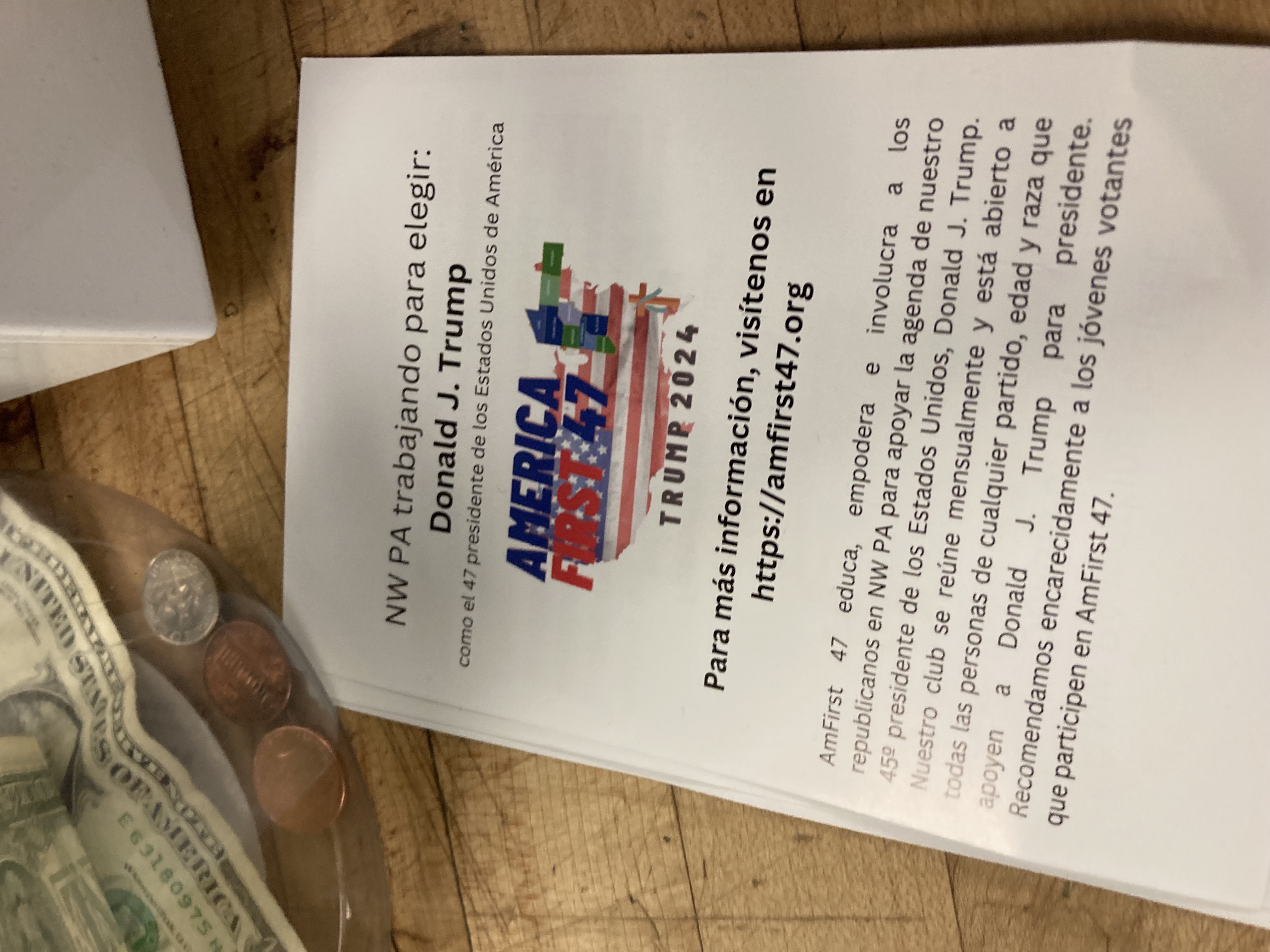

AmFirst 47’s leaders are well-versed and well-connected in politics. “Our members have personally met presidents Johnson, Nixon, Ford, Carter, Reagan, H.W. Bush, Clinton, George W. Bush, Obama, and Trump,” the group’s website notes.
Board member Louis Aliota has a special connection to Trump. His father worked for Trump’s dad, Fred, in the 1950s and ’60s.
“I met ‘The Donald’ in 1967-’68 when I was going to pharmacy school at the Brooklyn College of Pharmacy, and he was at the military academy,” says Aliota.
He adds, with a chuckle: “I should have stayed friends with him.”
Because of his personal experience with the Trumps, Aliota admired “the appreciation that the Trump family gives to those individuals that give a day’s work, loyalty, and integrity.”
Aliota later moved to Pennsylvania, where he campaigned for Trump in 2016. He was part of a group that spent several months erecting 300 four-by-eight campaign signs. That effort may have helped Trump win Erie County—and, accordingly, Pennsylvania—that year, Aliota said.
Since then, Aliota, a pharmacist, has remained devoted to conservative causes. He paid $300,000 to fight a First Amendment case against a school board—and eventually won.
Aliota says he and others with AmFirst 47 are focused on “trying to preserve our constitutional republic—period.”
Ruffa first became involved with politics in the 1980s. He served as a staffer for the Republican National Committee in Washington. Also, he held positions in the White House under Republican President Ronald Reagan, in the U.S. Congress with Rep. Gerald Solomon (R-N.Y.), and the Pennsylvania Senate.
Politics, however, took a back seat while Ruffa focused on his medical career. Now that he is semi-retired, he’s diving headlong back into politics.
He and other AmFirst 47 leaders have learned from past mistakes.
AmFirst 47 board member Greg Hayes ran to become a state assemblyman in 2020. But, Hayes said, “I got ‘Trump-ed,’” explaining that vote tallies initially showed he was winning on Election Night, just as Trump seemed to be. Trump still disputes the results of the 2020 election; he has never conceded.
In Hayes’ case, his opponent benefited from about 10,000 mail-in ballots days after the election, while only 1,000 came in for Hayes.
The importance of mail-in ballots was further underscored last fall across the United States. One prime example involved John Fetterman. Despite concerns about health and other controversies, he sailed to victory for a coveted U.S. Senate seat.
Democrat midterm-election victories such as Fetterman’s were attributable to a “white wave” of mail-in ballots, The Epoch Times reported. Those wins preempted a predicted “red wave” of Republican victories even as discontent with Biden’s Democrat administration escalated.
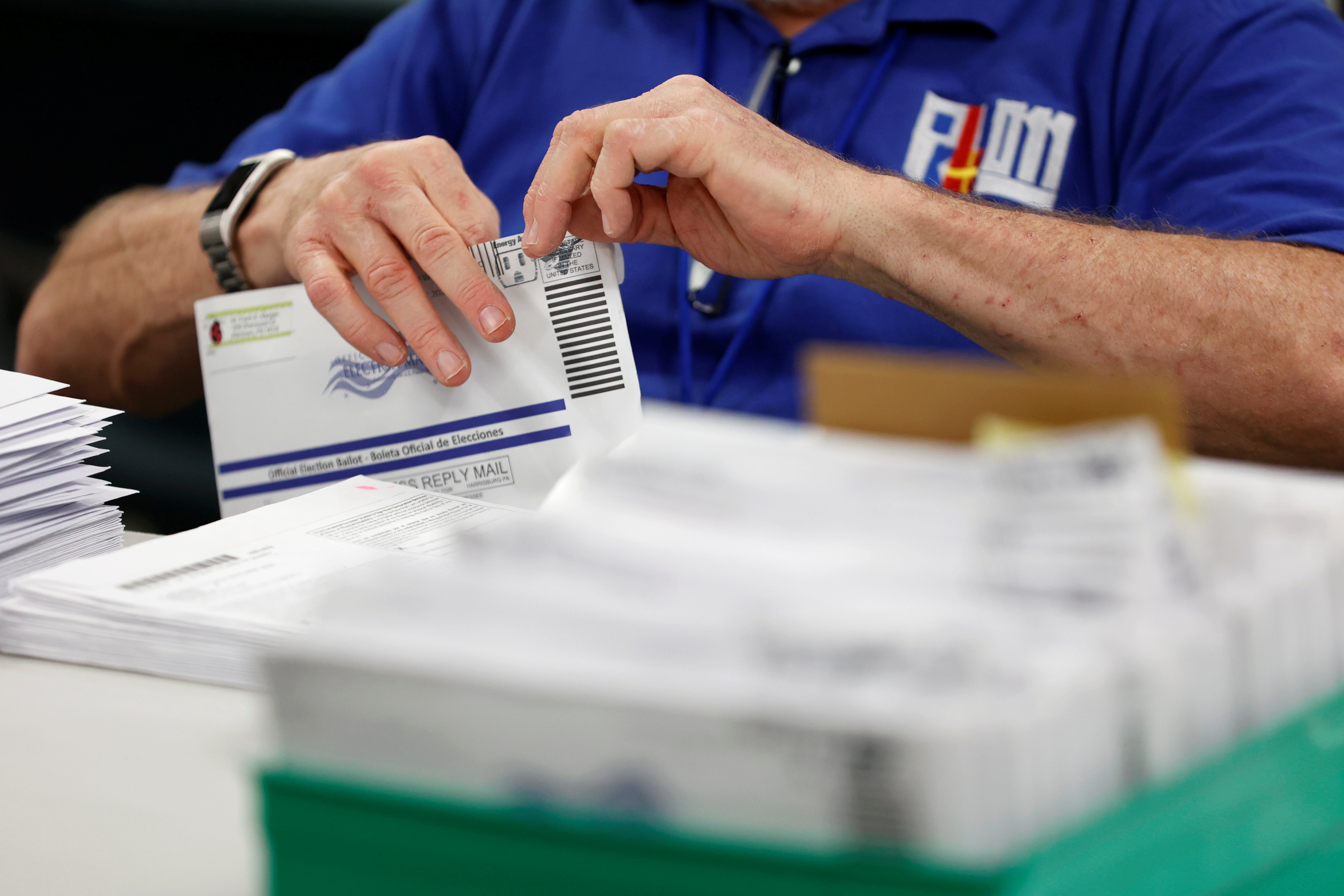

Such outcomes prove that Republicans need to set aside their reliance on in-person, Election-Day-only voting, said Melanie Brewer, another AmFirst 47 leader.
For years, Republican voters were told to avoid mail-in ballots because “’they’re wrought with fraud,’” Brewer said. But Democrats have “capitalized” on the opportunity to encourage early or mail-in votes from “the busy mom or dad who has four kids, baseball and softball practice and everything, and forgets that it could be potentially Election Day,” Brewer said. “Those are the voters that the Left has garnered.”
Ruffa credits Brewer for being at “the epicenter of Erie politics.” Numerous politicians turn to her for advice in Erie County and throughout the entire AmFirst 47 target area, Ruffa said.
He thinks Brewer will be a key player in elevating AmFirst 47, along with Brad Peganoff, who has long been involved with state and governmental affairs, particularly in workforce development.
Peganoff, a graduate of the executive development program at the North Carolina Center for Creative Leadership, became fascinated by Trump years ago.
“I read Trump’s book, ‘The Art of the Deal,’ I think when I was a freshman in high school, and I read it more than once; not many people in high school were reading that,” Peganoff said.
Since then, Peganoff has worked with state and federal candidates and government leaders, helping them to communicate well with blue-collar workers, “the five a.m., dented-metal lunchbox type of people.” Such workers have “a totally different mentality” than teachers, for example, who work abbreviated schedules and have a nice pension accumulated by age 45, Peganoff said.
That’s one of the unique challenges of engaging voters in Erie County, where there is a dichotomy between large white-collar and blue-collar workforces.
The county’s largest employer is the Erie Indemnity Co., an insurance firm whose campus dominates the city of Erie. Another top employer is Wabtec Corp., which designs and manufactures railroad cars, engines, and other freight and transit rail equipment.
Ruffa says Peganoff has the unusual ability to establish rapport with people from various backgrounds. He’s connected to Trump’s son Eric, but also has ties to “Republicans that I never even knew were for Trump. He has a great relationship with all of them,” Ruffa said.
Nathan Gonzales, the publisher of InsideElections.com, considers Pennsylvania to be one of four “toss-up” states in the 2024 presidential contest. The others are Arizona, Georgia, and Wisconsin; 270towin.com agrees.
Biden won each of those states by a slim margin in 2020, Gonzales noted in a recent column, adding: “Either party’s nominee will likely need to win three of the four states in 2024 in order to win nationwide.”
Among those states, the Republican Party’s chances for victory are most remote in Pennsylvania, where Democrats have an estimated 4.1-point advantage, according to Gonzales’s analysis.
Erie County, where AmFirst 47 is based, is home to about 173,000 voters; there are about 14,000 more Democrats than Republicans, according to current state voter registration totals.
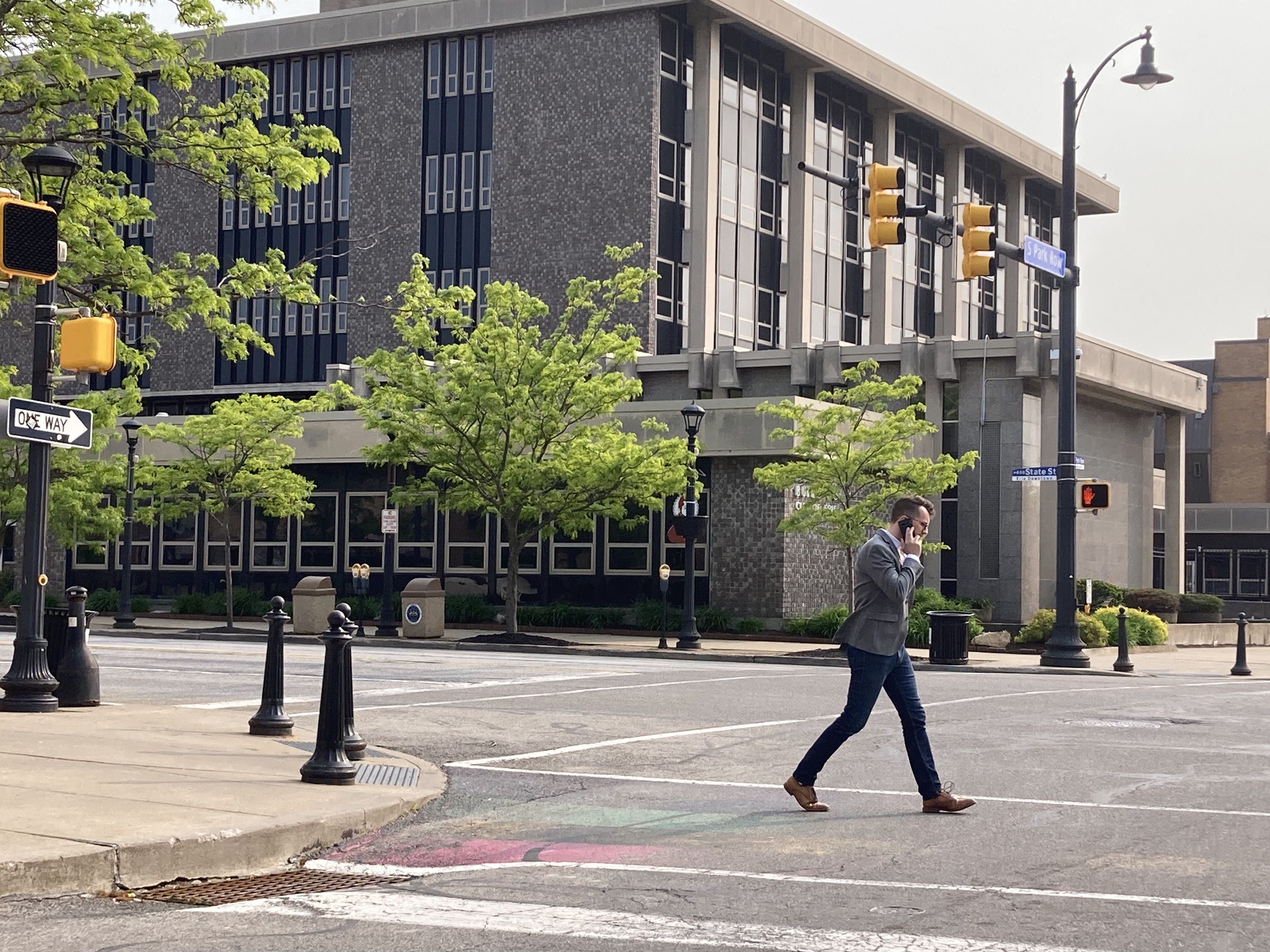

Over the years, Pennsylvania’s population has dipped. As a result, the number of votes the state is allotted in the Electoral College, which declares the presidential election winner, has dwindled.
Even so, the Keystone State still contributes 19 electoral college votes toward the 270 votes needed for victory.
In 2020, Trump lost Erie County—and the state, which then had 20 electors. Those electoral votes went to Biden. The opposite was true in 2016, when Trump prevailed in the county, state, and nation.
Pennsylvania voters have trended increasingly Democratic since 2000, voting for Republicans only 17 percent of the time, according to Ballotpedia.com.
Pennsylvanians are good at picking winners, too. They voted for the winning presidential candidate 77 percent of the time from 1900 to 2020.
In particular, Erie County has long been considered a “bellwether” county, or a predictor of how the political winds are blowing.
But its citizenry and even party leaders have been known to be fiercely independent in their voting choices.
Several high-powered Republican politicians broke rank and voted for Biden in 2020.
Perhaps the most prominent, respected defector was Tom Ridge. He served multiple terms as a Pennsylvania governor and U.S. congressman. Ridge was such a trusted GOP leader that President George W. Bush appointed him the nation’s first homeland security director. That happened after the terrorist attacks on America on Sept. 11, 2001.
Like Ridge, many citizens in the Erie County area have been known to split their votes among Republican, Democrat, and Independent candidates.
Joe Wisinski, 86, a retired tool-and-die maker and avowed “fish-aholic” who loves casting his line into Lake Erie, says he has voted Republican most of his life.
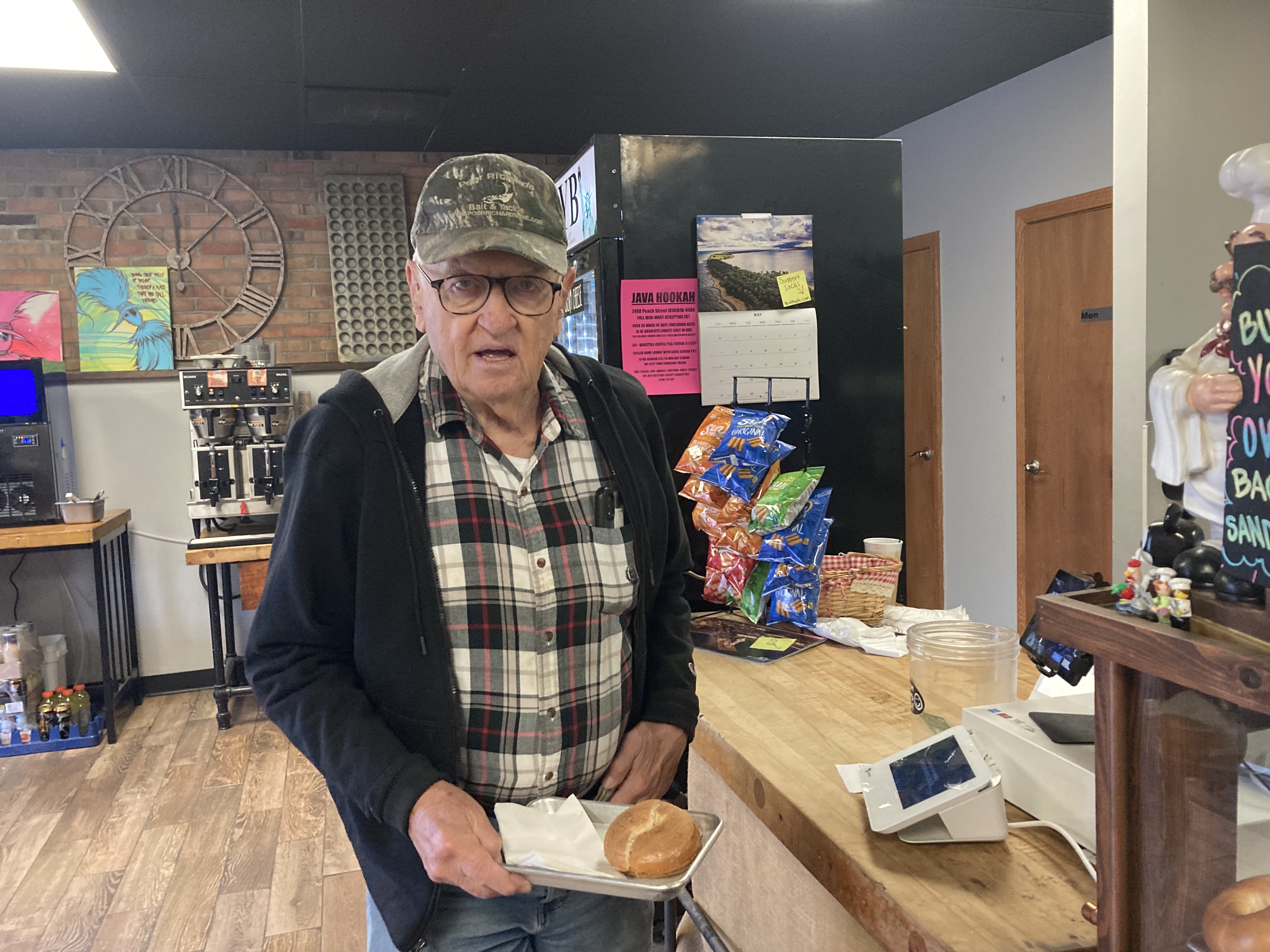

“But that doesn’t mean I won’t vote for a Democrat if I like ‘em,” he told The Epoch Times as he ate breakfast at New York Bagel & Deli on May 23. Wisinski is such a regular, employees start prepping his favorite–bagel with cream cheese, toasted—as soon as he arrives.
Wisinski said he likes Trump’s policies but takes issue with his brashness. “He can’t shut his mouth,” Wisinski complained. Still, he said it’s too soon to decide which presidential candidate will get his vote.
Making a voting decision is difficult because it’s hard to find trusted sources of information about candidates, Wisinski said. “I listen to the news, and I ask myself, ‘Is that really true?’”
Still, he takes pride in being a faithful voter. Smiling broadly, Wisinski said he and his wife “have never missed voting” during their 70 years together, 64 years as a married couple.
Another regular at the bagel shop, Kevin Asmus, a 45-year-old father of five who served in the Marines and works as a welder-mechanic, said, “I’d like to see Trump back in there again… Biden is just an embarrassment.”
But he, too, wishes Trump would ease off on the rhetoric.
AmFirst 47 leaders recognize that is an issue the former president faces.
“People complain about his mean tweets” or other inflammatory remarks Trump makes, Hayes said. He counters: “How’s it going to affect you personally? It’s not. So, when you look at that, get over those tweets. With everything that’s going on right now, it’s not going to take a Mr. Nice Guy to come in and fix it.”
Brewer thinks that many people who voted for Biden are regretful now. “It only hits home when it hits pocketbooks and when it hits their own family,” she said.
“I believe that the average voter is looking back on the 2020 election now and saying, ‘Would we have Ukraine and Russia? Would we have the high gas prices?’” Brewer said. “I feel like the average voter sees now the benefit of a strong CEO-like president like we had.”
In addition to policy concerns and economic conditions, personal connections can heavily influence voting decisions.
Even though many candidates rely heavily on political ads, “the most effective way to turn out voters is with high-quality, face-to-face conversations that urge them to vote,” a pair of researchers wrote in a 2014 Vox article.
“Two decades of rigorous random experiments” proved that “having an actual conversation is crucial,” the researchers said.
They noted, “when canvassers rush through scripted interactions, just trying to cram their message into voters’ minds, the impacts they leave are minimal.”
More recently, one of the same researchers, Joshua Kalla, now an Assistant Professor of Political Science at Yale University, found that “campaigns are actually able to teach voters new information,” according to a 2022 blog post.


Kalla studied the 2020 election and discovered that “voters knew a lot less about Joe Biden than they did about Donald Trump.”
As a result, voters were more receptive to new information about Biden, whether it was pro-Biden or anti-Biden.
Learning new information about Biden “was able to move vote choice more than pro- or anti-information about Donald Trump,” Kalla said.
“The more specific that information is, the more effective that persuasion can be,” he said.
Based on Kalla’s findings, a lesser-known challenger to either Trump or Biden might be able to take advantage of the “new information” effect. That could present a challenge to the pro-Trump clubs since they’re supporting a candidate whom most people feel they “know” already.
Two bagel shop employees said repeated political conversations have affected their voting habits.
Clerk Kim Edwards, 59, said, “I just don’t follow politics that much. I was never interested in it.” So, when it comes to voting, she relies on the advice of her 39-year-old son, who is constantly researching political issues.
Edwards, who also works as a bartender in Erie, said that, between her two jobs, she hears from many people who are now supporting Trump because they’re so disenchanted with the direction Biden has taken the country.
However, she said an older regular at the bar has remained steadfast in his support of Biden. But his arguments aren’t resonating with the other patrons, Edwards said.
The bagel shop’s manager, Iraq veteran Matt Hess, 38, said, “I haven’t heard anyone saying they want Biden back.” A close relative who is a Democrat voted for Trump previously, he noted, but he has also heard some people express interest in voting for DeSantis.
A father of five with a sixth child on the way, Hess says high grocery prices and ideological indoctrination of children are major concerns for him. He blames both situations on Biden’s policies; all but one of Hess’s children are home-schooled because of such concerns.
Meanwhile, Mike Ryen, a 36-year-old who preps food orders, said hearing others in the bagel shop talk about Trump motivated him to cast his first-ever ballot for Trump in 2020. He intends to vote for Trump again. Ryen believes that Trump kept America’s safety and security paramount and sent the world a strong message: “Don’t mess with us.”
Ryen is an example of the type of citizen AmFirst 47 hopes to reach.


Formerly named Club 45 USA, Florida’s Club 47 USA boasts a membership roster of 17,000 people.
“I don’t think you’d find any similar club that draws people in the thousands on a regular basis like ours,” Larry Snowden, its president, told The Epoch Times. Meeting attendance rarely dips below 1,000 and often exceeds 2,000; political heavy-hitters regularly speak there.
Conservative commentators have included Dan Bongino, Project Veritas Founder James O’Keefe, Actor Kevin Sorbo, Gen. Michael Flynn, and former House Speaker Newt Gingrich.
Next up: 2022 Arizona gubernatorial candidate Kari Lake is scheduled to speak at a sold-out Club 47 event on June 12. Media coverage is allowed only if the guest speaker approves, Snowden said.
Based a few miles from Mar-a-Lago, Trump’s home in Palm Beach, Florida, the Palm Beach County organization welcomed the former president as the guest speaker to overflow crowds on President’s Day this year and in April 2022.
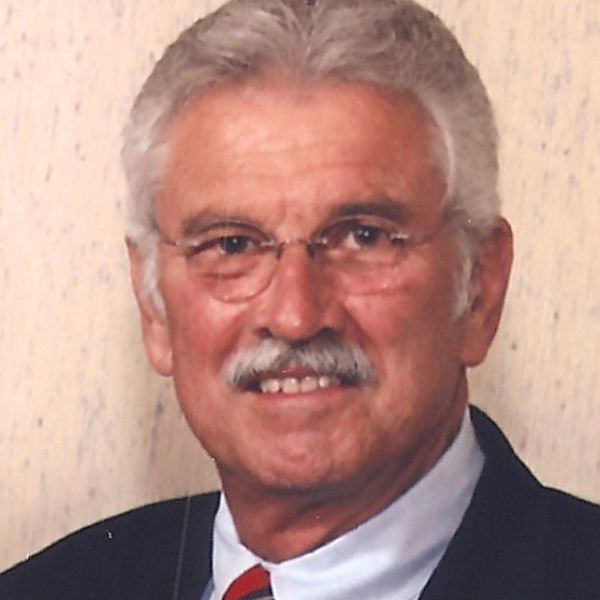

Snowden, who was part of the group that formed the Palm Beach County club in January 2018, said the group initially operated without charging admission fees; there are no membership dues. However, he said the group now charges a nominal fee to cover venue costs.
“You can still come to our club meetings for $10,” a reasonable price to pay for hearing from nationally known speakers, Snowden said. The group charges up to $25 apiece for VIP seats.
The club’s founding members considered becoming a charter club under the Republican Party. But attendees at early meetings resoundingly rejected that idea, Snowden said.
“I’m sure there were a number of reasons for that. But one of the big reasons is we had Democrats and Independents coming,” Snowden said. “So, from that day forward, we never gave any consideration to being a Republican club.”
Still, all three of Club 47’s current board members—vice president Linda Stoch, Snowden, and his wife, Sue, the group’s secretary—are all Republicans.
“And we do encourage people to become a part of the Republican club and the Republican Party. But that’s not our major focus,” Snowden said. “Our major focus is all about President Trump and his reelection.”
Snowden, 77, has been voting for Republican leaders his whole life and has been involved in Florida politics throughout the 32 years he and his wife have lived there. His wife, in particular, had been hoping Trump would run for office long before he announced his candidacy. His ride down a golden escalator on June 16, 2015, in New York City’s Trump Tower, is still seared in many people’s memories.
Snowden said it felt “natural” to support Trump by forming a club in his honor.
The club appeals to a broad range of people, Snowden said, adding, “We have billionaires who attend our meetings. We have people that are living off of Social Security attending our meetings… But they do have that one thing in common, and that is they’re all Trump supporters.”
Club 47’s proximity to Trump’s home, which served as Trump’s de facto winter White House, probably has played a role in the club’s popularity, he said. “The main reason it’s such a success, though, is President Trump. People are very, very excited about the president.”
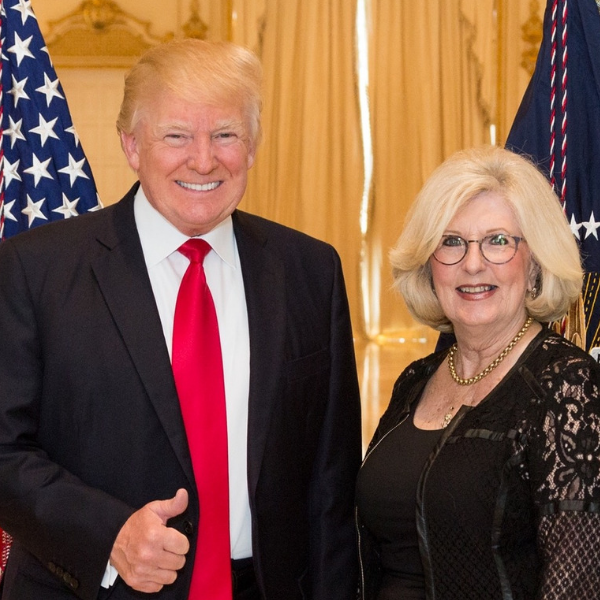

Snowden advises Ruffa and others seeking to form pro-Trump clubs: “Never let it be about yourselves… That’s something we have never, ever done. It’s always been about President Trump. And it’s been about people and the support, and it’s never been about money.”
Snowden said that failure to follow those simple principles has killed similar fledgling organizations.
Snowden said his group has “stayed the course,” regardless of Trump’s ups and downs. In fact, the former president’s legal woes, including a criminal indictment in late March, have motivated more people to be involved with Club 47.
“When these legal challenges occur, we have much greater attendance, much greater support,” he said. “And the polls are all in sync with the experience we have right here with our club.”
Snowden said the group hasn’t tried to gauge its effects on voter registration numbers or engagement. But members are encouraged to vote and become active in their communities. Some fly from distant states to attend Club 47 meetings.
And people frequently share how good they feel to be involved. They will say, “I never voted before President Trump came along.” Such comments are “very, very frequent,” Snowden said.
Snowden is confident that Club 47 is making a difference in building support for Trump. If not, Snowden said, “We wouldn’t spend our time doing this.”

![Enjoy the [Road] Show Travel Mug with Handle, 14ozEnjoy the [Road] Show Travel Mug with Handle, 14oz](https://georgemagazine.com/wp-content/uploads/2024/08/479070202831754764_2048-300x300.jpeg)


Discount Applied Successfully!
Your savings have been added to the cart.